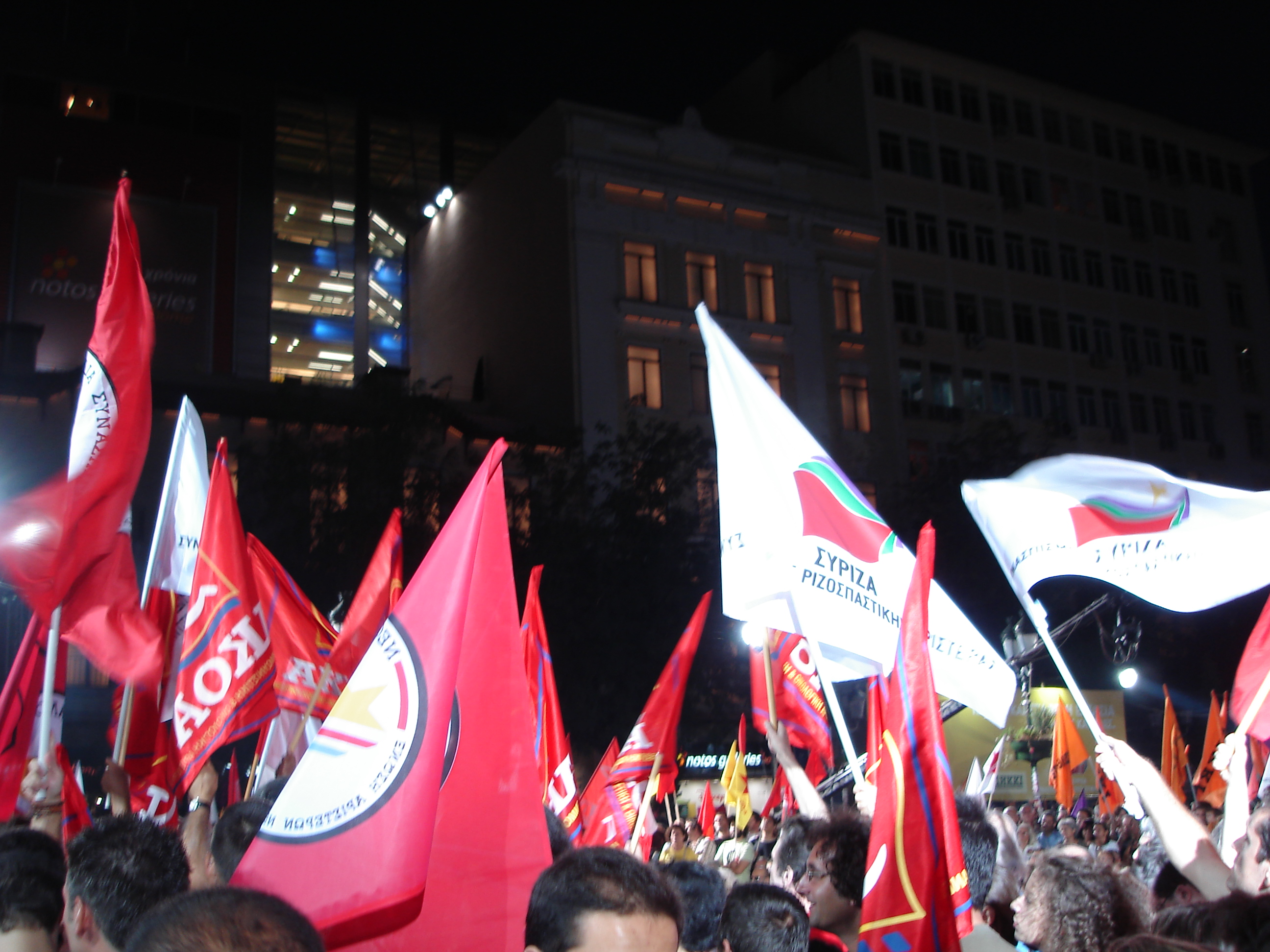Greek Election: Who’s Who?
by Novara Reporters
7 January 2015

This month both mainstream and alternative media is likely to be dominated by the upcoming Greek general election. As things stand, Syriza – officially known as the Coalition of the Radical Left – looks set to win a plurality. Opinions fluctuate over whether Syriza will win outright or have to lead a coalition government, but the rather complex Greek electoral system favours the party that achieves a plurality by awarding 50 ‘bonus’ seats, which could well push Syriza into holding a majority provided it achieves about 36% of the total vote. If a majority is still not achieved, a coalition will need to be formed.
So who are the parties fighting for power? Who are the potential coalition partners? And who have got other things on their minds?
1. Syriza.
Founded in 2004 as an electoral alliance and 2012 as a party, Syriza rose to prominence in Greece in 2008 in the aftermath of riots that took place following the murder of a 15 year old student by police officers. They were accused of “patting the hooded rioters on the back” by the Communist Party for refusing to condemn the rioters, instead attacking statements made against the riots as “slanderous”.
During Lucas Papademos’s unelected technocratic premiership in 2012, Syriza’s support swelled as a mainstream anti-austerity voice with a broad composition, from social democrats to eco-socialists to eurocommunists. Today it holds a slim but constant lead over current government party New Democracy. The leadership seems to sway ideologically and has been accused of indecisiveness, but the party’s strong anti-austerity platform is making the bond markets, big business and the European leadership sweat.
2. New Democracy.
The current rulers and the dominant neoliberal/socially-conservative bloc. Initially indecisive about the EU bailout, they supported the 2012 technocratic government and have pursued a thoroughly pro-austerity agenda since.
If they win it’s unlikely they’ll achieve a majority, meaning they would likely look to form a coalition with the malleable remnants of PASOK and the repugnant Golden Dawn.
3. Golden Dawn.
If you haven’t heard of Golden Dawn by now, you need to get up to speed. Seriously. Jostling with Hungary’s Jobbik for the loathsome title of ‘most popular European neo-Nazis’, Golden Dawn have been responsible for numerous attacks on immigrants, ethnic minorities, LGBT people and left wing activists – some of which have been lethal.
They are currently the third biggest party in Greece and could be a candidate for a New Democracy-led coalition. Its leaders have openly applauded the Third Reich and following an investigation last year, a state prosecutor ordered all 16 Golden Dawn MPs to face trial. Regardless, the fascist party still enjoys support in the police. A Syriza win won’t go down well with their supporters.
4. To Potami.
A lot is made of the parallels between Syriza in Greece and Podemos in Spain, what with their general ‘left populist’ outlook and sudden rise in support. But remember Syriza has been on the scene for ten years or so, and its leader has worked through all the radical left circles since his Young Communist youth.
A better parallel – minus the meteoric opinion poll success – would be To Potami (The River). Led by Stavros Theodorakis, a broadcaster-turned-politician (remind you of anyone?), the party aims to gain left-of-centre appeal largely through Theodorakis’s media personality and public appearances. Though not even a year old To Potami can expect to return a few seats under Greece’s semi-proportional voting system, so it could well make an appearance in a Syriza-led coalition.
5. Communist Party (KKE).
Known for its anachronistic Stalinism and ultra-sectarianism, the KKE still enjoys staunch support with some working class voters and sections of the labour movement, meaning it will almost definitely return some seats. However, it’s more likely that the KKE would be refusing to enter a parliamentary coalition with Syriza than vice-versa, which is probably to the relief of the more left libertarian sections of Syriza’s ranks given it was the KKE who guarded the parliament building when young people and anarchists were trying to break into it in 2011.
6. PASOK.
It’s hard to believe that just over five years ago, PASOK – the Panhellenic Socialist Movement – won an election with 44% of the vote and a sizeable majority in parliament. Historically situated along similar lines to Labour in the UK, their support crumbled during the financial crisis as they oversaw the Troika’s bailout package. Some of their more left wing members jumped ship to Syriza, following swathes of their supporters, and just last week their previous leader, George Papandreou, announced a split to form a new party.
7. Independent Greeks.
The Independent Greeks party was formed in 2012 as a right wing anti-austerity party hoping for a share of the populist pie. Since its briefly promising start (attracting around 10% of the vote), support has dwindled and in December it dropped under 3%, which is the threshold for parliamentary representation. Makes the party slogan “We are many” look a bit silly.
8. Various Anarchists.
The Greek anarchist movement has waned in recent years, and it has become well known in anarchist scenes across the world for its individualism, insurrectionism and internal sectarianism. Regardless, there are many anarchist groups active in Greece, some of whom are pretty hard-line when it comes to Molotovs and car bombs. The elections will be of little consequence for many of Greece’s anarchists, but it’s fair to say some will probably be making a special effort to see Golden Dawn off the streets. Expect fireworks.
